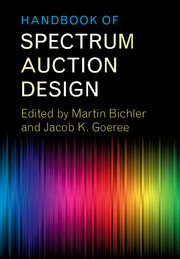Book contents
- Frontmatter
- Contents
- List of Contributors
- Preface
- List of Papers
- Part I The Simultaneous Multiple-Round Auction
- Part II The Combinatorial Clock Auction Designs
- Part III Alternative Auction Designs
- Part IV Experimental Comparisons of Auction Designs
- Part V The Bidders’ Perspective
- 31 Winning Play in Spectrum Auctions
- 32 Up in the Air: GTE's Experience in the MTA Auction for Personal Communication Services Licenses
- 33 Bidding Complexities in the Combinatorial Clock Auction
- 34 Strategic Bidding in Combinatorial Clock Auctions – A Bidder Perspective
- 35 Impact of Budget Constraints on the Efficiency of Multi-lot Spectrum Auctions
- Part VI Secondary Markets and Exchanges
- Outlook
- References
34 - Strategic Bidding in Combinatorial Clock Auctions – A Bidder Perspective
from Part V - The Bidders’ Perspective
Published online by Cambridge University Press: 26 October 2017
- Frontmatter
- Contents
- List of Contributors
- Preface
- List of Papers
- Part I The Simultaneous Multiple-Round Auction
- Part II The Combinatorial Clock Auction Designs
- Part III Alternative Auction Designs
- Part IV Experimental Comparisons of Auction Designs
- Part V The Bidders’ Perspective
- 31 Winning Play in Spectrum Auctions
- 32 Up in the Air: GTE's Experience in the MTA Auction for Personal Communication Services Licenses
- 33 Bidding Complexities in the Combinatorial Clock Auction
- 34 Strategic Bidding in Combinatorial Clock Auctions – A Bidder Perspective
- 35 Impact of Budget Constraints on the Efficiency of Multi-lot Spectrum Auctions
- Part VI Secondary Markets and Exchanges
- Outlook
- References
Summary
Introduction
Proponents of the Combinatorial Clock Auction (CCA) for spectrum awards often argue that the format offers two important advantages over the Simultaneous Multiple Round Auction (SMRA): it eliminates aggregation risk by allowing for package bids; and it facilitates efficient outcomes through incentives for straightforward value-based bidding. While the first argument is irrefutable, the second argument is often questioned by practitioners, and recently by the academic literature on auctions as well.
In this paper, we address the question of whether the CCA provides incentives for straightforward bidding in the context of spectrum awards. Straightforward bidding in a CCA describes a strategy where a bidder: (a) bids in each clock round for the package with the highest surplus (intrinsic value of package less clock price of package); and (b) submits bids at full valuation for all desired packages in the supplementary round. The paper builds on the authors’ practical experience with designing spectrum auctions and advising bidders participating in them, spanning more than 15 years.
Evidence from recent spectrum awards using the CCA format suggests that bidders often do not bid straightforwardly in practice, and there are multiple explanations for this. In Section 2, we identify reasons why bidders may not follow the advice of straightforward bidding. Our list includes complexity, the impact of the core pricing principle, budget constraints, and preference for good relative outcomes. Each of these factors provides a rationale for deviating from straightforward bidding in a CCA, under certain circumstances.
Spectrum holdings play a role in determining the level and type of services that mobile operators can offer their customers; spectrum is particularly important for rollout of next-generation LTE services, and associated service attributes such as speed, network capacity and in-building coverage. Under certain conditions, this may create so-called “strategic investment” value for operators, that is value in excess of the intrinsic value to operators which is derived from the competitive benefits of denying spectrum to rival operators. In Section 3, we discuss whether the CCA format may create stronger incentives for bidding based on strategic value relative to other auction formats.
- Type
- Chapter
- Information
- Handbook of Spectrum Auction Design , pp. 748 - 763Publisher: Cambridge University PressPrint publication year: 2017



